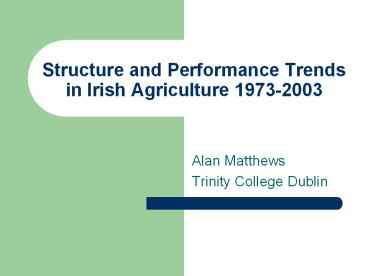Structure and Performance Trends in Irish Agriculture 1973-2003 - PowerPoint PPT Presentation
Title:
Structure and Performance Trends in Irish Agriculture 1973-2003
Description:
Structure and Performance Trends in Irish Agriculture 1973-2003 Alan Matthews Trinity College Dublin Task of the paper In the light of the immediate challenges to the ... – PowerPoint PPT presentation
Number of Views:58
Avg rating:3.0/5.0
Title: Structure and Performance Trends in Irish Agriculture 1973-2003
1
Structure and Performance Trends in Irish
Agriculture 1973-2003
- Alan Matthews
- Trinity College Dublin
2
Task of the paper
- In the light of the immediate challenges to the
future of farming - to examine performance and structural change in
Irish agriculture in the 30 years since EU
membership - Part of the context and rationale for the
development of alternative farm enterprises
3
Declining role of farming
4
Fewer numbers at work in farming..
5
More multiple job-holding
6
Trend in gross agricultural output
7
Trends in input use
8
Ratio of input costs to output
9
The cattle breeding herd
10
Growth in milk yields
11
Growth in sheep and pig numbers
12
Declining terms of trade
13
Aggregate farming income
14
Number and average size of farms
15
Increase in minimum viable size
16
Increased scale in dairying
17
Sweeping change in the pig sector
18
Widespread distribution of suckler cows
19
Land market has collapsed
20
What can we say about growth?
- Growth momentum appears to be exhausted
- not because of the exhaustion of productivity
growth - but because of constraints on increasing output
- the change in policy priorities to give more
emphasis to environmental values - and reducing economic incentives
21
What can we say about income?
- Stability in the aggregate income from farming
has been supported by increased direct payments - but no budget to pay further compensation in the
unreformed sectors.. - and inflation is eating away at the real value
of existing payments.. - off-farm income will continue to increase in
importance in farm households
22
What can we say about structures?
- Rapid structural change at the enterprise level..
- .. and increasing minimum viable farm size..
- .. contrast with the unchanging pace of decline
in farm numbers and employment regardless of
economic conditions.. - .. and the constipated state of the land market
23
What can we say about structures?
- Support to drystock enterprises is encouraging
farmers to hold on to land because of the
subsidies this attracts while most of the income
is coming from off the farm.. - ..but drystock is now totally uncompetitive at
market prices.. - Would funds be better directed at creating viable
alternative enterprises to maintain rural areas?































